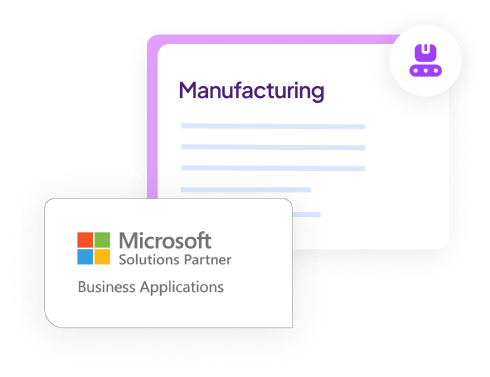Trends and Outlook
in the Manufacturing Industry
30%
Cloud adoption has enabled up to 30% cost savings in IT infrastructure, allowing manufacturers to scale more efficiently.
40%
Nearly 40% of manufacturers have accelerated their intelligent factory initiatives by incorporating AI, automation, and IoT.
60%
Over 60% of manufacturers focus on AI and machine learning to improve supply chain resilience and demand forecasting.
75%
According to Deloitte, three-quarters of manufacturers invest in digital twin technology for predictive maintenance and real-time operational insights.
The manufacturing industry is undergoing significant transformation, driven by digital advancements such as AI and IoT. As these technologies reshape operations, manufacturers must adapt swiftly to stay competitive. At Imperium Dynamics, we enhance Microsoft Business Applications with AI to help manufacturers thrive by boosting productivity, optimizing processes, and driving sustainable growth.


Current Industry Challenges
Manufacturers navigate complex global supply chains, often facing disruptions caused by geopolitical tensions or natural disasters. These challenges can result in delays and increased costs Enhancing visibility and flexibility through advanced tracking and forecasting technologies offers an immediate solution.
Adapting to ever-changing regulations and standards across different regions presents an ongoing challenge for manufacturers. This includes compliance with environmental regulations and safety standards. To meet these demands, manufacturers require robust compliance management systems capable of quickly adapting to new requirements.
Balancing optimal productivity with cost control is a constant challenge for manufacturers. Inefficiencies often arise from outdated processes or equipment. By implementing lean manufacturing principles and adopting automation technologies, manufacturers can streamline operations and minimize waste.
Integrating advanced technologies, such as IoT and AI, while equipping the workforce to use these tools effectively, poses a significant challenge. Addressing this requires investing in scalable digital platforms and implementing comprehensive training programs to ensure smooth transitions and maximize the value of new technologies.

Manufacturers manage intricate and global supply chains. Disruptions, such as those caused by geopolitical tensions or natural disasters, can lead to delays and increased costs. Immediate solutions involve enhancing visibility and flexibility through advanced tracking and forecasting technologies.
Keeping up with ever-changing regulations and standards across different regions is a continuous challenge. It includes adhering to environmental regulations and safety standards. To address this, manufacturers need robust compliance management systems that quickly adapt to new requirements.
Achieving optimal productivity while controlling costs is a balancing act. Manufacturers often face inefficiencies due to outdated processes or equipment. Implementing lean manufacturing principles and adopting automation technologies can help streamline operations and reduce waste.
Integrating new technologies, such as IoT and AI, while training the workforce to use these tools effectively presents a significant challenge. Immediate solutions involve investing in scalable digital platforms and providing comprehensive training programs to ensure smooth transitions and effective utilization of new technologies.

How Microsoft Business Applications Address Manufacturing Industry Challenges
01
Intelligent Production Optimization
AI embedded within Microsoft Business Applications helps manufacturers streamline production processes. By analyzing real-time data from machines, materials, and workflows, AI identifies inefficiencies and suggests improvements, optimizes resource usage, and increases production speed. This results in more efficient operations and improved product quality.
02
Enhanced Customer Engagement
Using AI within Dynamics 365 Marketing, manufacturers can automate and personalize customer interactions, improving engagement for both B2B and B2C clients. AI-driven tools enable manufacturers to tailor marketing campaigns based on customer behavior and preferences, leading to higher conversion rates and improved customer retention.
03
Streamlined Supply Chain Management
Microsoft Business Applications integrate AI to help manufacturers automate routine supply chain tasks, such as inventory updates and procurement processes. By providing real-time visibility across the supply chain, manufacturers can address logistical challenges more effectively, ensuring smoother operations and minimizing delays.
04
Built-in Compliance and Security
Manufacturers face stringent regulations and must comply with safety and environmental standards. Microsoft Business Applications offer integrated compliance management tools, delivering end-to-end traceability and ensuring data security through multi-layered protection.
Driving Manufacturing Excellence with Microsoft Business Applications

Advanced Quality Control
AI-driven solutions from Microsoft Business Applications improve quality control by identifying defects early in the production process. Machine learning algorithms analyze production data to detect anomalies, ensuring higher-quality output and minimizing waste.

Demand Forecasting
Inaccurate demand forecasting often leads to overproduction or stock shortages. Microsoft’s AI solutions analyze historical sales data, market trends, and customer behavior to generate more accurate demand forecasts. These insights help manufacturers optimize production schedules and inventory levels, achieving a 15% reduction in excess inventory and better alignment with market demand.
Explore our Manufacturing Webinar
Watch our on-demand webinars to see how we are addressing manufacturing use use cases and challenges heads-on.

17
October, 2024
Unleashing Team Collaboration with Power Apps:
A conversation on Real-Time Authoring and AI-Enhance Development
Explore the latest advancements in Power Apps that are reshaping how teams collaborate and innovate. This webinar will showcase the new real-time co-authoring feature in Canvas Apps and the introduction of AI-powered Copilot in Model-Driven Apps. Learn how you can leverage these tools to accelerate app development, streamline workflows, and enhance collaboration across teams with Imperium Dynamics.
Ready to take the next step in transforming your manufacturing operations?
Book a call with our Customer Success Managers today to discover how Imperium can help you navigate your business challenges with Microsoft Business Applications. Let's work together to optimize your processes, boost productivity, and drive sustainable growth in your manufacturing business.
Book a Call








